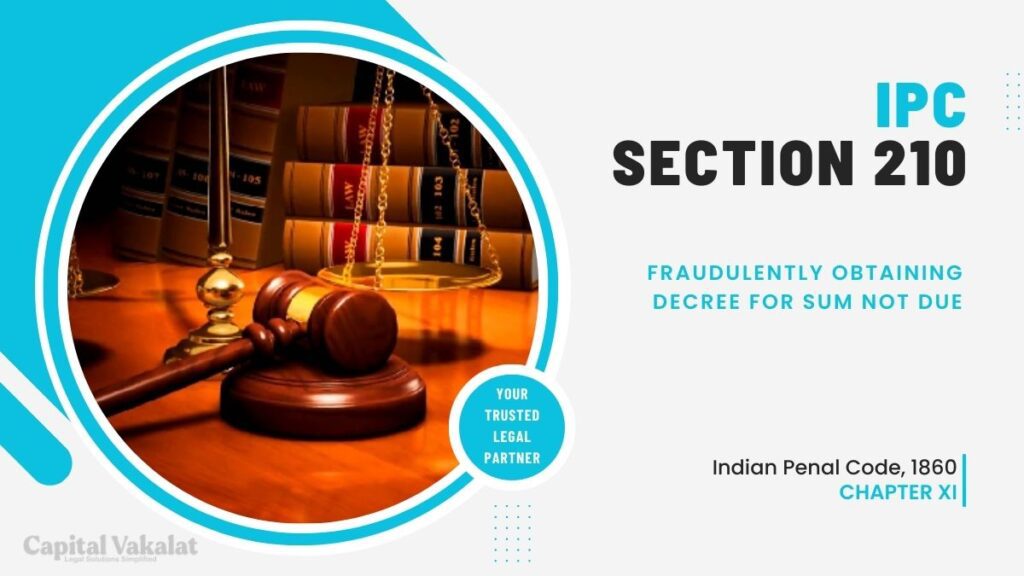Section 210 of the Indian Penal Code (IPC) is a crucial legal provision that aims to safeguard the integrity of legal proceedings by penalizing individuals who fraudulently obtain decrees for sums not due. This provision plays a significant role in maintaining the trust and fairness within the legal system.

In this article, we will delve into the nuances of Section 210 IPC, exploring its implications, cases, consequences, and challenges.
Understanding Section 210 IPC
Section 210 IPC is a legal provision that deals with situations where an individual, with the intent to defraud, knowingly makes a false claim before a court, leading to the issuance of a decree for a sum that is not actually due. To establish an offense under Section 210, certain elements must be present. The offender must intentionally:
- Make a false claim or produce false evidence.
- Knowingly make the claim false.
- Cause a court of justice to pass a decree based on this false claim.
This section is in place to ensure that the judicial process remains untainted by fraudulent practices.
Cases and Precedents
To understand the real-world implications of Section 210 IPC, let’s consider some past cases. One notable case involved a businessman who, in a property dispute, presented forged documents to prove ownership of a valuable piece of land. The court, relying on this fraudulent evidence, issued a decree in his favor. Subsequently, it was discovered that the businessman had intentionally misrepresented the facts. Section 210 IPC was invoked, and he faced legal consequences.
Such cases emphasize the importance of preventing fraudulent practices within the legal system and upholding the sanctity of court proceedings.
Penalties and Consequences
Individuals found guilty of violating Section 210 IPC can face severe penalties. The punishment can range from imprisonment to fines, or both. Additionally, a person convicted under this section may also suffer from a tarnished reputation, affecting their social and professional life.
The consequences of such fraudulent acts not only impact the guilty party but also erode trust in the legal system, which relies on honesty and integrity.
Challenges in Proving Section 210 IPC
Proving a case under Section 210 IPC can be challenging. Gathering concrete evidence to establish the accused’s intent to defraud is often complex. Moreover, the burden of proof lies on the prosecution, which must demonstrate that the claim was knowingly false. These challenges necessitate a robust judicial process and a vigilant judiciary.
Preventive Measures
To protect themselves from false allegations and ensure a fair legal process, individuals should be cautious about the authenticity of the claims they make before the court. Seeking legal counsel and maintaining transparency in legal proceedings can help mitigate the risk of unintentional false claims. It’s crucial for all parties involved to ensure that the court’s decision is based on accurate information.
The Role of Legal Professionals
Legal professionals, including lawyers and advocates, have a significant role to play in upholding the integrity of the legal system. They must adhere to the highest ethical standards, ensuring that they do not knowingly present false claims or evidence in court. Professional misconduct can result in severe consequences, including disbarment.
Conclusion
Section 210 IPC is a fundamental provision in Indian law that safeguards the fairness and integrity of legal proceedings. It serves as a deterrent against fraudulent obtaining of decrees for sums not due. By understanding the implications, cases, consequences, and challenges associated with this section, we can collectively work toward preserving the sanctity of the legal system.
Frequently Asked Questions
Can unintentional misrepresentation lead to charges under Section 210 IPC?
No, Section 210 requires that the false claim be made knowingly and with fraudulent intent. Unintentional mistakes or errors are generally not covered.
How can one protect themselves from false allegations under Section 210 IPC?
Seeking legal counsel, maintaining transparency in legal proceedings, and ensuring that claims and evidence are accurate can help prevent false allegations.
Are there any recent amendments or changes to Section 210 IPC?
As of my last knowledge update in January 2022, there were no significant amendments to Section 210 IPC. It’s advisable to check for any updates with a legal expert or the latest legal sources.
What is the importance of Section 210 IPC in upholding the rule of law?
Section 210 IPC plays a crucial role in ensuring that the legal system operates with fairness and integrity. It discourages fraudulent practices that could undermine trust in the judiciary and the rule of law.